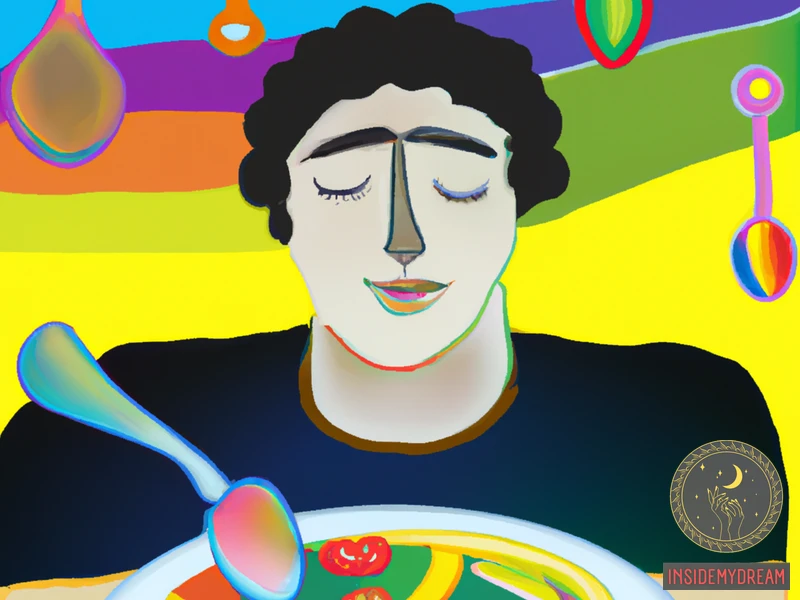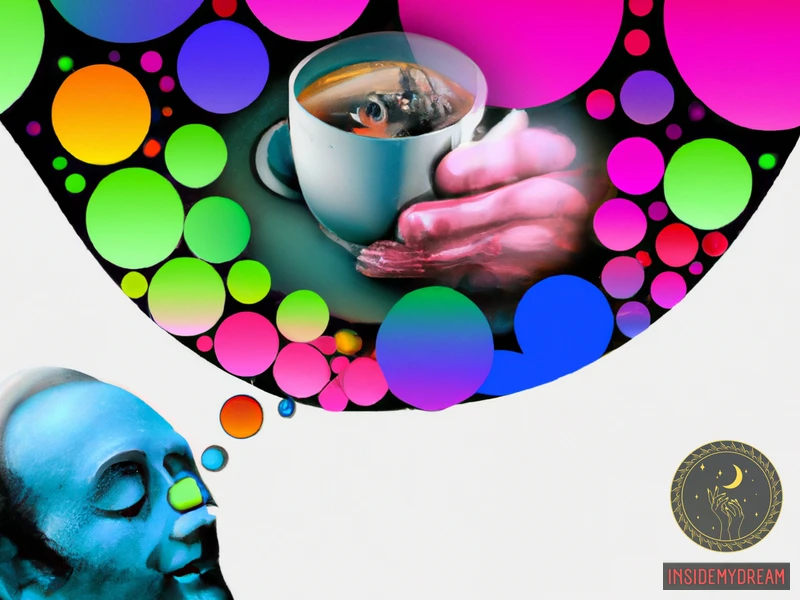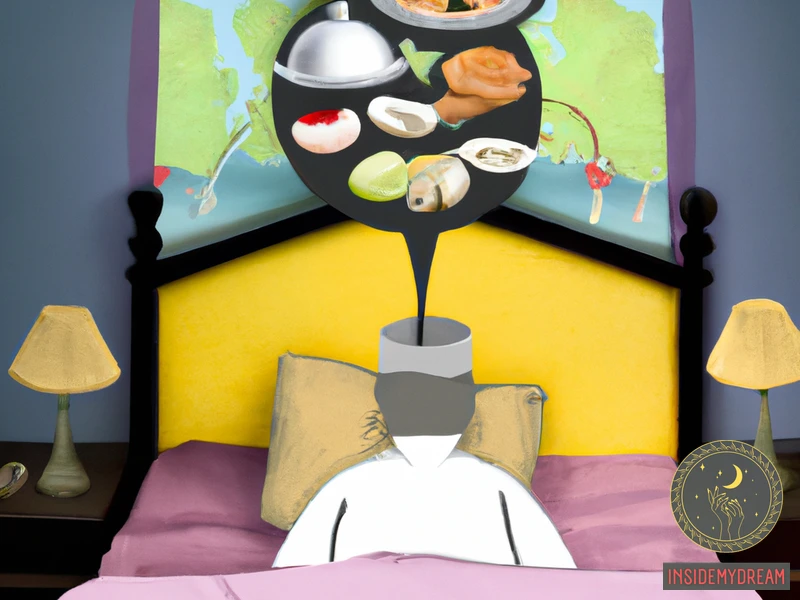Do you ever find yourself dreaming of a delicious meal, only to wake up and realize that it was all just a dream? Have you ever wondered if it was possible to actually taste something in your dreams? “Can you taste in dreams?” is a question that has been debated for years. Science has been able to shed some light on this topic, and this article will explore what science has to say about the ability to taste in dreams.
What Is Dream Tasting?

Dream tasting is the phenomenon of experiencing tastes while dreaming. Reports of dream tasting have been documented as far back as Ancient Greek times and some scientists believe it is a way of our brains processing reality. Scientists have conducted numerous studies to find out if people can truly taste in their dreams. The results of these studies have been mixed, with some suggesting that dream tasting is indeed possible while others argue that it is merely a figment of our imagination.
Can You Taste in Your Dreams?
Research has shown that people can experience tastes in their dreams, however, it is not clear how this happens. Some studies suggest that dream tasting is due to our brains attempting to make sense of the sensory input from our environment by using our memories of tastes and smells. Other studies suggest that it could be related to our emotions and how we process them. It is also possible that dream tasting is caused by a combination of both.
Overall, scientists still do not have a definitive answer as to whether people can taste in their dreams. However, research into this phenomenon is ongoing and there are promising results that suggest dream tasting is a real phenomenon.
What Does Science Say About Dream Tasting?
Dreams have long been a source of mystery and wonder. While the exact function of dreams is still not completely understood, one interesting phenomenon is the ability to taste in dreams. While it is not fully understood, studies have been conducted to understand the sensation better.
Subscribe and Get a Free Dream Journal from Us
Studies on Dream Tasting
A study conducted by the University of Geneva found that a third of the participants experienced taste in their dreams. The study consisted of participants writing down their dreams over the course of a few weeks to note any instances of taste. The study also found that those who experienced taste in their dreams were more likely to experience other sensations such as smell and touch in their dreams as well.
Is Dream Tasting Common?
Dream tasting is a relatively common experience, with many people reporting experiencing taste in their dreams. The sensation can range from pleasant to unpleasant depending on the dream, with some reports of tasting foods and drinks, and even tasting emotions. While the exact reason why people can taste in their dreams is still unknown, it is believed to be linked to the sensations experienced in waking life.
What Causes Dream Tasting?

Neurological Factors
The neurological factors that can cause dream tasting are related to the neurological pathways in the brain. The brain is responsible for interpreting sensory stimuli, including taste, and this is how taste is experienced in dreams.
Psychological Factors
The psychological factors that can cause dream tasting include the thoughts, feelings, and memories that a person has during the day. These can influence the content of a dream, and can lead to dream tasting.
Stress
High levels of stress can also cause dream tasting, as stress can affect the brain’s ability to process sensory information. Stress can also lead to vivid dreams, which can make dream tasting seem more real.
How Does Dream Tasting Affect Sleep?
Dream tasting can have a significant effect on sleep quality and duration. Studies have shown that people who experience dream tasting are more likely to experience:
- More vivid dreams
- Longer dreams
- More intense emotions during dreams
- More frequent dream recall
Dream tasting can also alter the quality and duration of sleep. People who experience dream tasting are more likely to experience longer sleep cycles, more restful sleep, and an overall better quality of sleep than those who don’t experience dream tasting. This is because dream tasting can help reduce stress and anxiety levels, allowing for more restful sleep.
Dream tasting can also affect the amount of time spent in REM sleep. Studies have shown that those who experience dream tasting are more likely to spend more time in REM sleep than those who don’t. This can be beneficial for those who struggle with insomnia and other sleep-related disorders, as REM sleep is essential for regulating mood, learning, and memory.
Finally, dream tasting can influence the amount of dream-related activity that occurs during sleep. People who experience dream tasting are more likely to report higher levels of dream lucidity, dream recall, and dream control. This can be beneficial for those looking to explore the dream world or improve their dream recall skills.
Overall, dream tasting can have a significant effect on sleep quality and duration. It can reduce stress and anxiety levels, increase REM sleep, and increase dream-related activity, which can all lead to improved sleep.
What Are the Benefits of Dream Tasting?

- Boosts Memory: Dream tasting can help improve memory recall and recall of past experiences. This is due to the sensory input of taste that can be used to trigger memories.
- Heightens Awareness: Dream tasting can help you become more aware of your senses and tune into the environment and events around you.
- Improves Concentration: Dream tasting can help you focus your attention and concentration on the task at hand. This can help with problem solving and creative thinking.
- Increases Creativity: Dream tasting can help you become more creative by allowing you to tap into different parts of your brain. This can help with finding new and innovative solutions to problems.
- Reduces Stress: Dream tasting can help reduce stress and anxiety levels. It helps to relax the mind and body and promote a sense of peace and well-being.
- Improves Sleep Quality: Dream tasting can help to improve sleep quality by providing an uninterrupted and restful sleep. This can help to reduce fatigue and increase energy levels during the day.
How Can You Enhance Dream Tasting?
- Keep a dream journal: Keeping a dream journal can help you remember your dreams more clearly and in greater detail. It also encourages deeper reflection on the dream’s meaning and its potential connections to your waking life.
- Consider dream symbolism: In addition to remembering your dreams, you can also explore symbolic meanings associated with dream food. Dream symbolism can help you to understand the deeper meanings of what you’ve experienced in your dream.
- Practice lucid dreaming: Lucid dreaming is a practice that involves becoming aware of one’s dream state and consciously controlling the dream experience. Practicing lucid dreaming can help you to become more aware of your dreams and to better control your dream environment and experiences.
- Meditate and practice mindfulness: Meditating and practicing mindfulness can help to reduce stress and clear the mind, which can lead to more vivid dream experiences. Mindfulness and meditation can also help you to become more aware of dream states and to remember your dreams more easily.
- Take dream herbs: Some herbs, such as mugwort, are believed to produce more vivid dreams and help to remember them more easily. It’s important to talk to your doctor before using any herbs or supplements to ensure they are safe for you.
These practices can help to improve dream recall and enhance your ability to experience dream tasting. As you become more aware of your dreams, you may be able to recognize the taste of dream food and gain insight into the deeper meanings of your dream experiences.
Frequently Asked Questions
Is it Possible to Taste in Dreams?
Research suggests that taste is one of the few senses that can be experienced in dreams. Dreamers have reported being able to taste a variety of flavors, including sweet, salty, sour, and bitter. Studies have shown that the taste of food in dreams is similar to the taste of the same food when eaten in real life. It is believed that the dreamer’s memories of past experiences influence the tastes they experience in their dreams.
How Can You Tell If You Are Tasting Something in a Dream?
Dreams are complex and subjective experiences. Taste is one of the senses that can be incorporated into a dream, but it can be hard to tell if you are actually tasting something or if the sensation is just part of the dream. To determine whether you are tasting something in a dream, pay attention to the details of the taste, such as texture, flavor, and intensity. Additionally, if the taste is something that you wouldn’t normally eat, or it is a taste that is more vivid than usual, then it could indicate that you are tasting something in your dream.
Is there a scientific explanation behind why we can or can’t taste in dreams?
- Dreams are controlled by the brain – Dreams are generated by the brain and are formed by the connections between neurons. As such, it’s possible that the brain is responsible for our ability to taste in dreams.
- Dreams may be influenced by our physical senses – Studies have shown that physical senses can influence our dreams. For example, if we are exposed to a particular smell, our dream may become more vivid. This suggests that physical sensations, such as taste, may also have some influence on our dreams.
- We may be able to taste in dreams if we are dreaming about food – Studies have shown that people who are dreaming about food are more likely to report being able to taste in their dreams. This suggests that the brain is able to conjure up tastes when dreaming about food.
- We may be able to taste in dreams if we have a strong emotional connection to the dream – Our emotional state can influence our dreams, and studies have shown that people who are emotionally connected to their dreams are more likely to report being able to taste in them.
- We may be less likely to taste in dreams if we are dreaming about abstract concepts – Dreams about abstract concepts, such as ideas or emotions, are less likely to include a sense of taste. This could be because the brain is not able to create a realistic sense of taste for these types of dreams.
Overall, it appears that there is a scientific explanation for why we can or can’t taste in dreams. Our dreams are influenced by our physical senses and our emotional state, and these factors can determine whether or not we are able to taste in our dreams.
Are some people more likely to taste in dreams than others?
- Yes, some people are more likely to taste in dreams than others. A study conducted by the University of Amsterdam in 2017 found that people who had frequent lucid dreams were more likely to taste in their dreams than those who had infrequent lucid dreams.
- The study also found that people who reported having frequent nightmares were more likely to taste in their dreams than those who had infrequent nightmares.
- Additionally, the study found that people who were more proficient in their dream recall capabilities were more likely to taste in their dreams than those who had poorer dream recall capabilities.
- Lastly, the study concluded that age could also be a factor in determining if someone is more likely to taste in their dreams, with older people being more likely to experience taste in their dreams than younger people.
The study suggests that certain physiological and psychological factors can make some people more likely to taste in their dreams than others. However, further research is needed to better understand the exact mechanisms behind this phenomenon.
Are the tastes in dreams similar to what we experience in real life?
Research suggests that taste in dreams may be similar to what we experience in real life. A survey of over 4,000 respondents revealed that common flavors experienced in dreams include chocolate, vanilla, coffee, and pizza. Interestingly, sweet flavors were most commonly reported, while sour, salty, and bitter were significantly less reported. Additionally, some people reported that the taste of their dreams was different than what they experience in real life, with some claiming that the taste was “unreal” or “unnatural”.
Conclusion
To conclude, evidence suggests that taste can be experienced in dreams, although the exact mechanism is still unclear. In some cases, taste in dreams appears to be influenced by the dreamer’s environment and the foods they recently consumed. Although further research is needed to understand the exact nature of taste in dreaming, it appears to be a phenomenon that can be experienced by many people.










